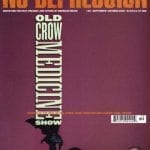The Black Keys – Modern Primitives
Most days, Dan Auerbach and Patrick Carney can’t believe how far they’ve come in their half-decade together as the Black Keys. What was once nothing more than two friends banging around in a basement in Akron, Ohio, is now a full-time job that has enabled them to quit mowing lawns for a living and even to buy houses in their hometown.
They have played all the late-night talk shows that matter, and have heard their songs in Hollywood movies such as School Of Rock. Where Auerbach and Carney once opened rejection letters from indie labels including Estrus, K, and Flying Bomb, their new album, Magic Potion (due September 12), finds the Black Keys in the majors for the first time, recording for the Warner-affiliated Nonesuch.
Yet in spite of all this, there are those who wonder if the Black Keys are capable of much more, if they aren’t their own worst enemies.
“A long line of people have tried to pressure Dan and I into making a certain kind of record that we’re never going to make,” says Carney, the duo’s long, lanky, and bespectacled drummer. “It’s always the same type of record — a clean, radio record, I guess is the best way to describe it. If we were to sit down and try to make that record, a) we would hate ourselves for it, and b) we’d be doing it just so other people could make money off it. It just doesn’t make any fucking sense.
“The weird thing for Dan and I is that we obviously want people to like our records,” he continues, “whether it’s a thousand people or a lot more than that. Since we’ve been putting out records, it’s happened that a lot more than a thousand people like them. It’s already grown to be something that I never expected would happen. I’m very happy with how things are and how lucky we’ve been. And it stresses me out that somebody would think it isn’t fucking good enough.”
What the Black Keys are semi-famous for are albums that sound like they were recorded in the world’s most rocking gin joint. The band’s 2002 debut Big Come Up, with its distortion-blasted guitars, gut-thump drums, and bourbon-cured vocals, established a sonic template that Auerbach and Carney stubbornly stick to. Not surprisingly, then, Magic Potion is American music at its most powerful, overamped, and primal. Those descriptions will also do for 2003’s Thickfreakness and its follow-up album Rubber Factory.
That back-to-basics rawness has, right from the beginning, gotten the Black Keys labeled a blues band, albeit one based in the same territory as the White Stripes. And no matter how much Auerbach may argue otherwise, there’s no disputing he often sings and plays guitar like a man with Mississippi mud under his fingernails. Still, both he and Carney will contend that they play nothing but basic rock ‘n’ roll. As they get ready to unleash their most anticipated record to date, the Black Keys have indeed never rocked harder.
Because of that, the two predict most modern-day blues music fans — i.e. those who wouldn’t know T-Model Ford from a Ford Escort — won’t begin to understand Magic Potion. For that, they make no apologies. Carney is only too happy to explain why.
“Technically, I hate the blues,” he confesses. “It’s got a lot of fucking garbage attached to it. The blues that I like is the stuff that a traditional fan would look at as the blues being exploited. I like Muddy Waters’ Electric Mud and Captain Beefheart. That’s rock ‘n’ roll with a blues influence, which is more along the lines of where Dan and I come from. As far as stuff like Kenny Wayne Shepherd and Stevie Ray Vaughan — I can’t listen to that shit at all. I would rather listen to Ace Of Base — and seriously would enjoy it more — than some guy in a duster.
“Actually,” the drummer corrects himself with a laugh, “I’d rather listen to a Zantrex-3 infomercial than any of that stuff.”
The point is made: Call the Black Keys what you will, but don’t dare suggest they’ve got the blues.
By all accounts, the artist who inspired the name the Black Keys is as deeply troubled as he is immensely talented.
“Alfred McMoore was a retarded schizophrenic,” the soft-spoken Auerbach says from his home. “He lived in a group home and would generally wear at least four three-piece suits, all at the same time, one on top of the other, layered. My dad, who was a folk-art dealer, would try to help him out, to keep him in art supplies and things, so he was around the house a lot when I was growing up.”
McMoore also spent time with the Carney family; initial contact was made when Patrick’s dad did a story on him for a local paper. The drummer remembers McMoore phoning the Carney home constantly in 2001, right around the time he and Auerbach were trying to decide on a name for their band.




